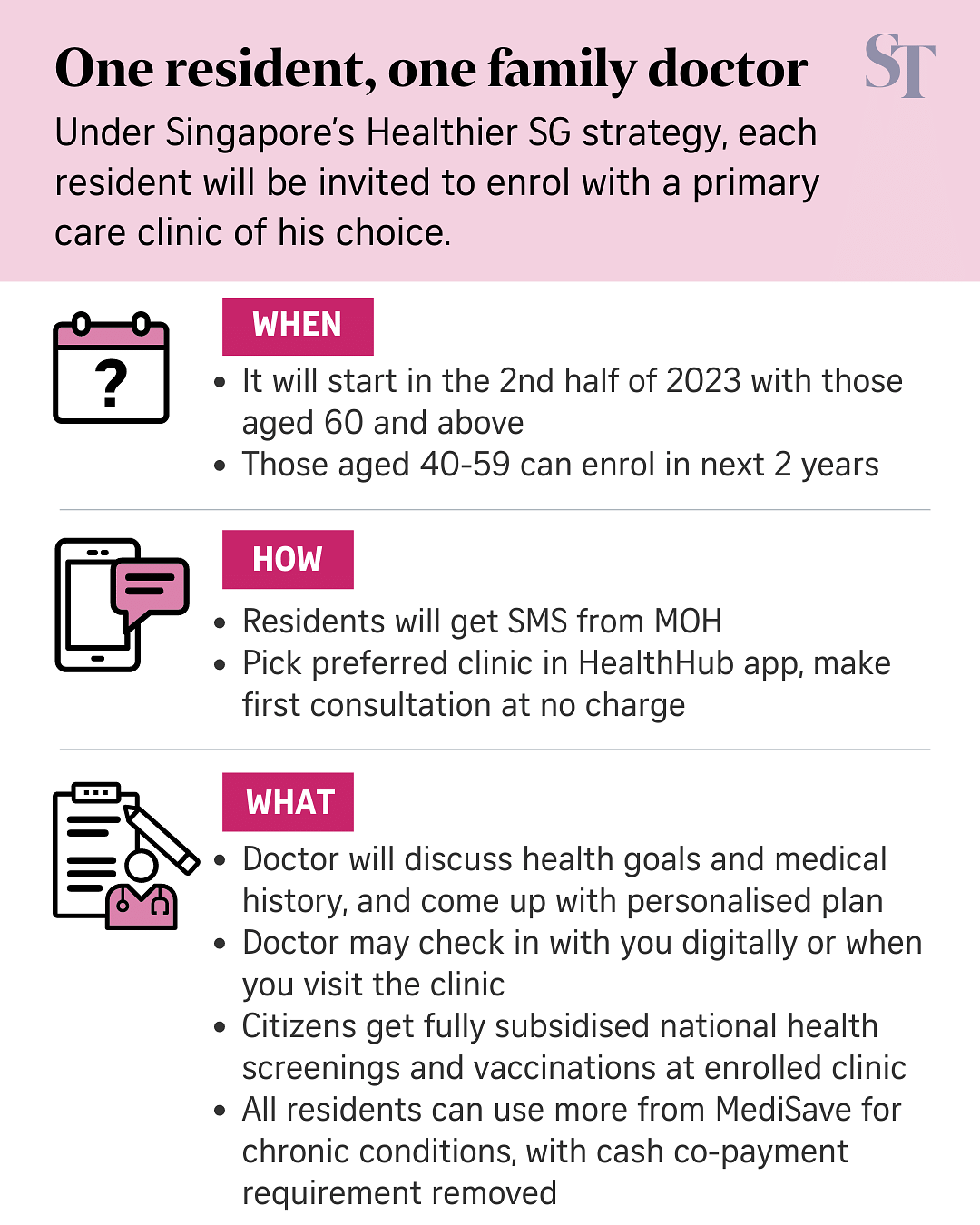SINGAPORE - When Mr Mohamed Fairoz, 51, a manager in the aviation industry, was too busy at work to pick up a refill of his medication for his diabetes, hypertension and cholesterol, his family doctor Dr Theresa Yap dropped them off so he wouldn't have to miss his doses.
"She really cares for her patients, and it's not just about treating and diagnosing them," said Mr Fairoz, who has been seeing Dr Yap since 2012 after he was discharged from hospital for a transient ischemic attack - a mini-stroke caused by a temporary disruption in the blood supply to part of the brain.
A self-professed lover of soda drinks and fried food, Mr Fairoz said he has been able to make changes to a healthier lifestyle with the help of Dr Yap, who keeps a close eye on his blood sugar levels digitally via a glucose monitoring device.
"I don't go out and eat all the nonsense because I know she will call me if she sees my blood sugar spiking," he said.
Their close patient-doctor relationship is an example of what health authorities hope to see more of with the launch of the Healthier SG programme in the second half of 2023. The initiative will see Singapore residents paired with a family physician so doctors can more holistically manage a patient's health and focus on prevention of illnesses.
Mr Fairoz, who pays $300 a month for his medications at the private general practitioner's (GP) clinic, is looking forward to sign up for the Healthier SG programme as he will be able to access his drugs at rates comparable to those at polyclinics.
Echoing his sentiments is a housewife who has been managing her diabetes, high cholesterol and hypertension at Jurong Polyclinic because it is the cheaper option. The 65-year-old, who wanted to known only as Madam K, goes for her ECG and blood tests every six months, and has tried requesting for a dedicated doctor to manage her conditions.
"I would like to see just one doctor because I will feel more comfortable and confident about the advice," she said, adding that if such a programme had existed earlier, she could have managed her gestational diabetes better and stood a better chance of avoiding her current diagnosis.
Ms Serena Ng, 64, would like to enrol in the programme despite being in the pink of health. While the part-time administrative worker exercises for up to 14 hours a week and avoids deep-fried food, she has a family history of liver cancer and dementia and would like to discuss with a family doctor how to prevent such diseases.
The buy-in of clinics and doctors would be needed for the Healthier SG programme to work, said GPs The Straits Times spoke to. Key to that is ensuring the Government gets the funding model right, they added.
GPs will be given an annual service fee to care for and manage each enrolled resident. The fee will be tiered based on the health risk profile and scope of required care. Family doctors will also get variable fees when they get their patients to comply with recommended vaccinations, screenings or tests.
Dr Fadzil Jaafar, a family physician at Mission Hougang Medical Clinic, and administrative lead of Class Primary Care Network which represents 68 doctors and 55 clinics, said the challenge with the proposed funding model is that some parts of the payment is tied to patients fulfilling relevant tests and procedures.
"GPs may not like this complexity. Also, doctors may not get these variable fees if patients don't do these tests or procedures for whatever reasons, even after doctors have tried encouraging and ordering them for their patients," he said.
Dr Kiran Kashyap, who has been a family physician at East Coast Family Clinic for 23 years, said the annual service fee needs to take into account that patients with chronic complex conditions require more appointments. GP clinics also have high overheads, including staff cost and rental of the unit, she added.
She said GPs in Singapore are able to keep consultation fees lower because there is some remuneration derived from the profit margin of medications dispensed. But with the Government providing medication at a lower price, the profit margin will drop and won't be able to offset the low consultation fees.
"Some doctors may find that they are not able to enrol in this programme because they cannot make ends meet if their remuneration overall drops because the profit margin has dropped. Either that or they have to raise their consultation fee significantly," Dr Kiran said.
Dr Yap, who has 40 years of experience at Yang & Yap Clinic and Surgery, estimates a patient with complex chronic conditions that are not well-managed could need up to four consultations a year and an appropriate annual fee would be in the region of $200.
For generally well patients, doctors would still need to discuss lifestyle and concerns and an appropriate fee would be around $50 to $80.

Despite their concerns, GPs are supportive of the scheme and interested to participate because pairing family doctors with residents will help develop closer ties, and therefore better health outcomes, they said.
Dr Kiran noted that trust is a major component of healthcare. "When patients have the confidence that whatever you tell them is in their best interest, they are more likely to comply with medication and any behaviour modification advice, like quitting smoking," she said, adding that patients have returned to her for advice even after consulting a specialist.
Dr Yap expects her patient load to rise after enrolment begins next year. The clinic currently sees about 40 patients a day and this could go up to 60, she said. To cater to the increase, the clinic is likely to extend opening hours, especially if there are more complex cases.
Dr Kiran said her clinic, which has two part-time doctors and five assistants, would likely be able to take in about 50 Healthier SG patients. While she is unlikely to extend opening hours, the clinic will make more efficient use of the appointment system to schedule consultations.
"Patients will be asked beforehand what they are coming in for, and if they have chronic medical problems, they will be given longer slots," she said.


